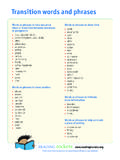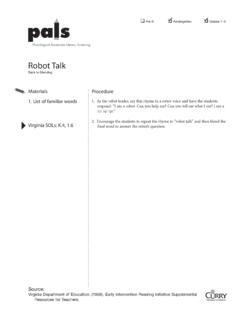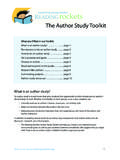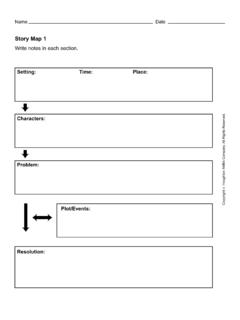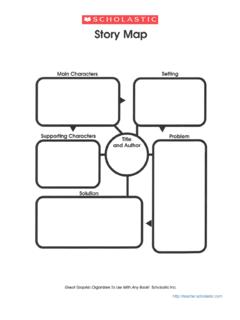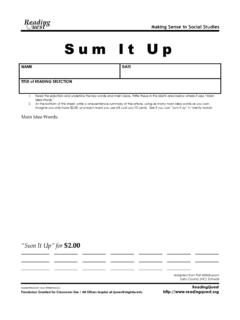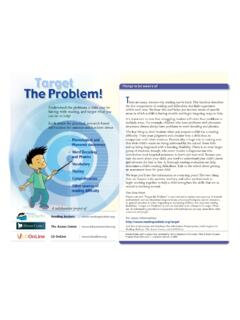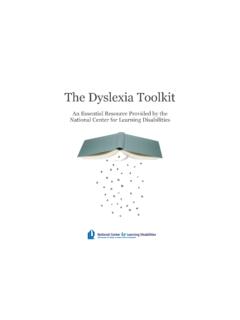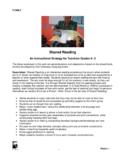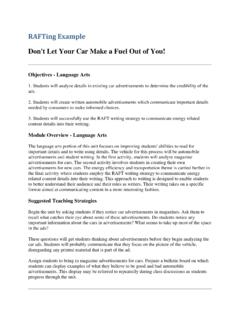Transcription of A Guide to Teaching Nonfiction Writing - Reading Rockets
1 Tony Stead Linda HoytA Guide to Teaching Nonfiction WritingExplorations in Nonfiction WritingGradesK 2firsthandAn imprint of Heinemann361 Hanover StreetPortsmouth, NH and agents throughout the world 2011 by Tony Stead and Linda Hoyt. All rights where noted, no part of this book may be reproduced in any form or by any electronic or mechanical means, including information storage and retrieval systems, without permission in Writing from the publisher, except by a reviewer, who may quote brief passages in a review. Dedicated to Teachers is a trademark of Greenwood Publishing Group, data for this book is available from the Library of Guide to Teaching Nonfiction Writing , Grades K-2 ISBN-10: 0-325-03775-2 ISBN-13: 978-0-325-03775-2 Explorations in Nonfiction Writing , Grade KISBN-10: 0-325-03774-4 ISBN-13: 978-0-325-03774-5 (lesson book)ISBN-10: 0-325-01342-8 ISBN-13: 978-0-325-01342-2 (kit)Explorations in Nonfiction Writing , Grade 1 ISBN-10: 0-325-03777-9 ISBN-13: 978-0-325-03777-6 (lesson book)ISBN-10: 0-325-02681-5 ISBN-13: 978-0-325-02681-7 (kit)Explorations in Nonfiction Writing , Grade 2 ISBN-10: 0-325-03780-9 ISBN-13: 978-0-325-03780-6 (lesson book)ISBN-10: 0-325-03143-6 ISBN-13.
2 978-0-325-03143-9 (kit)Cover photographs: Bill MillerDesign and production: Small PlanetPrinted in the United States of America14 13 12 11 10 VP 1 2 3 4 5 6To all the teachers who have embraced Nonfiction as the heartbeat of their Writing program Thank Heinemann: You never fail to amaze with your ability to listen, to coach, and to help a vision become reality. Tina Miller, Charles McQuillen, Harvey (Smokey) Daniels, Deb Doorack, David Stirling, Cynthia Nye, Carolyn McGuire. What a team!Lynnette Brent: You are amazing. Thank you so Petruccio, Doreen Osmun, and fellow educators from Hudson, Ohio. Oh, my! Working with you and sharing your celebrations of learning has been a joy. Thank you for all of the wonderful Writing samples and amazing moments with Porterfield, Lindy Sproul, Jennifer Patterson, Michael Shay, and teachers at Boones Ferry Primary School, Wilsonville, Oregon.
3 You offered counsel and professional thoughtfulness at a time when this project was but a dream. Thank you for your encouragement and generous sharing of student McCall, Anne Pergiel, and Marie Davis at Kinnaman Elementary School. You joined the call when we had little more than wet clay. Thank you for your faithful testing of lessons and feedback. You are the best!Barbara Coleman, Kristy Thomas, and teachers at Wingate Elementary School, Wingate, North Carolina. Thank you for testing lessons, reflecting on possibilities, and helping us find a path that took these lessons to a higher Govro and Leah Starkovich, trusted reviewers and amazing educators from Gilbert Park Elementary School, Portland, Oregon.
4 Thanks for the feedback and the fabulous cookies!Jodi Wilson, Angela Duff, and Eba Farzana from Holmes Elementary School, Spokane, Washington. You believe in possibility and it shows in the work of your writers. You raise the bar, open the door, and set high standards. The result is Stewart, sharp-minded, kindhearted, and always focused on Hill, treasured friend and passionate educator. Thank you for your contributions and shared Formica, Ileen Bichler, Maria Horvath, Jenny Malash, Odalis Neris, Sara Flores, Meredith Benvenuto, and the grade 1 team at PS 197, Bronx, New York. Your willingness to open up your classrooms and experiment with Nonfiction Writing made this resource Castronovo, Alice Lee, Fay Coccoli, Julie Cooke, Mary Murphy, Leonie Dodd, and the kindergarten, first-, and second-grade teachers at PS 105, Brooklyn, New York.
5 The projects you produced with your students clearly demonstrated that young children can achieve anything with the right Carrico, Cecelia Holt, Noemi Uribe, Melissa Leonard, and the staff at E. P. Rayzor Elementary School, Argyle, Texas. We have learned so much from you. Your school has demonstrated the power of inquiry-based learning in producing lifelong researchers and Kellum and the team at Denton Independent School District, Texas. You have been pioneers in successfully integrating Nonfiction into the everyday lives of your students. You re truly Wooding, Karen Flavin, Rhonda Wilhite, and the teachers from Alief Independent School District, Texas. What amazing projects your students produced!
6 Cathy Duvall and the teachers from Fort Bend Independent School District, Texas. Your enthusiasm to embrace Nonfiction was teachers at Twin Valley School District in Pennsylvania. What remarkable projects you produced with your students! Many thanks for your commitment to making Nonfiction a joyous occasion for all your Lackowitz, your photographs are appreciated! 1 Rationale for Teaching Nonfiction Writing 6 Building a Culture of Inquiry and Research11 Understanding the Goals of Teaching Nonfiction Writing18 Emphasizing the Writing Process31 Setting the Stage for Nonfiction Writing : Scaffolds for Success40 Focusing on Instruction: Explicit Supports That Lift Writing Quality47 ReferencesA G u i d e t o Teaching Nonfiction Writing CONTENTSR ationale for Teaching Nonfiction Writing 1 Rationale for Teaching Nonfiction WritingNonfiction Writing used to be saved for genre studies in which young writers created a set of directions or engaged in crafting a report about animals.
7 But, evidence now suggests that this limited view of Nonfiction Writing is "too little too late!" We now know that informational literacy that engages our youngest learners as readers and writers of Nonfiction texts needs to be an integral part of every learner s school experience from pre-school onward (Purcell-Gates, Duke, Martineau, 2007). We now know that forward-thinking educators of young children weave explicit scaffolds for Nonfiction Reading and Nonfiction Writing into the fabric of daily literacy instruction, making sure that children write for a wide variety of purposes and experience a broad array of Nonfiction text types (Hoyt, 2009, 2004; Stead, 2007, 2002; Saunders-Smith, 2010, Glover, 2009).
8 Explorations in Nonfiction WritingWhen I write, I wonderWhen I write, I thinkWhen I write, I learnWhen I write ..I wrap myself in the magic of Nonfiction Since young children are curious about the world , Nonfiction Reading and Writing should be woven throughout the curriculum from the minute they start school. By beginning early on, we are preparing young children for Nonfiction material they will be presented with and be expected to generate as they progress through the grades into adulthood. kelly davis, literacy coach, howard county, maryland2 A Guide to Teaching Nonfiction WritingteAch Nonfiction Writing explicitlyNonfiction Writing fills our lives. Everywhere we look there are newspapers, magazines, directions, street signs, recipes, letters, maps, menus, e-mails, Internet sites, and so on.
9 As writers, we make lists, craft letters, send e-mails, provide explanations, and jot notes. In the real world , we have clear purposes and select the text types that help us fulfill our goals for remembering, recording, and communicating to others. To be successful in school, in the workplace, and in our personal lives, we must learn about this wide range of Nonfiction text types so we can navigate and create them with comfort and purpose to gain control over the unique structures, language, and visual features that comprise the heart of Nonfiction texts. It is interesting to note that while informational texts make up the great majority of texts written and read by literate adults, far too few children are taught explicit strategies for Reading and Writing these text types (Barone and Mandell-Morrow, 2002).
10 EmphAsize Nonfiction Writing from the BeginningThe Common Core Standards (2010) along with grade-level expectations and standards from most states now call for a strong emphasis on Reading and Writing Nonfiction texts from the beginning. This means that learners of all ages need to become acquainted with the structures and features of informational texts, both as readers and as writers. They need to develop strategies for using those features to enhance understanding and increase efficiency in seeking and recording information and to communicate ideas. It was once thought that primary-grade learners were too young for Nonfiction Writing , but now we know that is not true. Even kindergartners love learning about the world while they are learning to read and learning to write.
